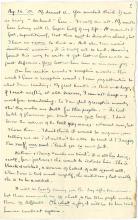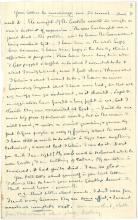BRACERS Record Detail for 18688
To access the original letter, email the Russell Archives.
"My Dearest O.—You mustn't think of me as being 'tortured' here—I really am not."
Letter 83
BR TO OTTOLINE MORRELL, 26 AUG. 1918
BRACERS 18688. ALS. Texas
Previous Brixton letter, BRACERS 19351; next letter, BRACERS 79641
Edited by K. Blackwell, A. Bone, N. Griffin and S. Turcon
<Brixton Prison>1
Aug. 26. ’18.
My dearest O.
You mustn’t think of me as being “tortured” here2 — I really am not. My months here belong with the happier half of my life. At moments I feel, superstitiously, that there must be disasters ahead; but I have no reason to think so. And when I can avoid irrational worries, it is really not so bad. Having found this way to write and get letters3 has made a great difference. Your letters have been an immense joy.
One has creative moods and receptive moods. This week I have a receptive mood: I can pay attention to what I am reading. My great trouble is that most days, if I read anything at all serious, I can not keep my mind from wandering. So I am glad of receptive moods, tho’ they make me dull for other people. — The last batch of flowers you sent were quite lovely. I don’t know the names of the tall spiky orange-coloured ones, but I love them. I don’t think it would be any use your telling me as I shouldn’t be able to read it! I enjoy the snuff very much. Thank you so much for it.
Katherine and Murry “make me tired”.4 It is all her doing, really, from jealousy: she wants to isolate him. She is black and wicked, a source of hatred of all against all. When I was in that mood myself, she suited me; but really she is to be avoided.
It will be lovely seeing you the day after tomorrow — but those moments are so short, and the other people make them so difficult. Oh what a joy it will be to have real human contact again.
Your letters do encourage me so much. And I need it. The weight of the hostile world so weighs on one’s instinct of expression. The war has taught one a great deal — the problem was to learn the lesson without being crushed by it. I have been on the whole happy here because I have been happy in the two big things: affection and purpose. There have been long times when I felt puzzled and baffled as to what I wanted to do and what I really believed; now I feel clear: I know what I believe and what I want to do. I have an inner harmony beyond what I have ever had, so that all my energy can go outward, as it should. Logic and imagination have fought a long fight in me,5 but I think they are reconciled at last. — I will do one more big piece of technical work,6 but in the main I will teach, and write on social questions, and generally put before people a way of feeling about the world. I have still a work to do which is bigger than anything technical;7 and now at last I believe I can do it. Don’t you think I am right? My work must be technical while the war lasts; I am talking of later. My ambition is revived: it had quite died. I am so glad.
You tell little about yourself in your last letter.8 I always like to have your news. Goodbye dearest O. Much much love.
your
B.
P.S. Don’t bother about novels. I don’t care for French ones, because they are some effort, and I want novels as complete rest. One more sheet,a and letter from Miss Wrinch9 which please destroy.
- 1
[document] The letter was edited from digital scans of the two half-sheet originals in BR’s handwriting and initialled by him in the Morrell papers at the University of Texas at Austin.
- 2
“tortured” here BR may have expected rough treatment in prison. He was appealing his conviction and sentence of imprisonment in the second division when he wrote this passage in Roads to Freedom:
“At present, when a man suffers from insufficient love for his fellow-creatures, the method of curing him which is commonly adopted seems scarcely designed to succeed, being, indeed, in essentials, the same as his attitude toward them. The object of the prison administration is to save trouble, not to study the individual case. He is kept in captivity in a cell from which all sight of the earth is shut out: he is subjected to harshness by warders, who have too often become brutalized by their occupation. He is solemnly denounced as an enemy to society. He is compelled to perform mechanical tasks, chosen for their wearisomeness. He is given no education and no incentive to self-improvement. Is it to be wondered at if, at the end of such a course of treatment, his feelings toward the community are no more friendly than they were at the beginning?” (London: Allen & Unwin, 1918, p. 135).
In the book’s second printing (in July 1919), BR added this note to the passage: “This was written before the author had any personal experience of the prison system. He personally met with nothing but kindness at the hands of the prison officials.” - 3
this way to write and get letters I.e., by concealing them in the uncut pages of books and journals.
- 4
Katherine and Murry “make me tired” Ottoline (letter of 17 Aug. 1918, BRACERS 114755) had complained that Katherine Mansfield and J. Middleton Murry had set themselves apart as the only true members of an artistic elect, but now “Poor Katherine ... hungers and thirsts after other people and longs for affection and friendship.” Ottoline blamed Murry for the original aloofness and was still sympathetic to Mansfield, pointing out that her mother had just died. She did not mention that Mansfield was seriously ill with tuberculosis, having been diagnosed in April, suggesting that Ottoline may not have been aware of this (though she and BR had previously discussed the possibility: see Letter 15). BR, however, continued to blame Mansfield (see Letter 48). It is not clear why BR put “make me tired” in quotation marks.
- 5
Logic and imagination have fought a long fight in me It is far from clear what BR had in mind here, but it seems to have been psychological. It does not concern the issues raised in his 1914 paper “Mysticism and Logic”, in which mysticism was by no means reconciled to logic, though both were commended. BR had the strongest possible impulse to logical thinking, while at the same time was deeply sensitive to poetry and other forms of beauty.
- 6
I will do one more big piece of technical work This plan did not come to fruition because (if he meant a single book to write) BR reduced the scope of The Analysis of Mind (1921) after his release, became involved in other projects and travelled to Russia and China. However, his philosophy of neutral monism, which he was developing at this time, did appear in that book.
- 7
a work to do which is bigger than anything technical BR never did write a very large book that was not technical philosophy or logic, although before he decided on Human Society in Ethics and Politics (1954) he outlined a compendium of his more systematic writings on political theory (BRACERS 48277). Perhaps BR meant by “a work” a task rather than a book to write.
- 8
your last letter Dated 25–27 August 1918 (BRACERS 114756).
- 9
Miss Wrinch It is not clear why BR wanted the letter destroyed — he did not give similar instructions for other letters from Wrinch.
Textual Notes
- a
One more sheet The sentence was added in pencil.


